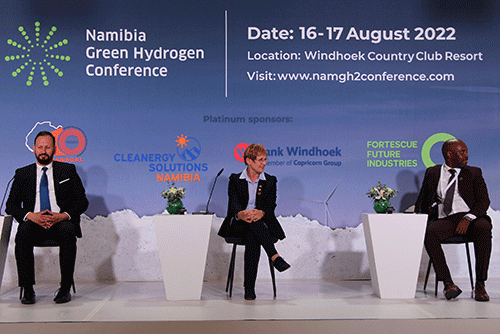As a connector of positive change, Bank Windhoek continues to play a critical role in the private sector and remains committed to support the government, financial industry and its customers to grow the economy. Bank Windhoek’s chief treasurer Claire Hobbs said this at Namibia’s first two-day Green Hydrogen conference, which concluded on Wednesday, 17 August 2022, in Windhoek. Hobbs said this collaboration would ensure that Namibia becomes Africa’s Green Hydrogen hub.
Hobbs observed that the size of the projects and the capital required are immense, and the government cannot be expected to provide all the necessary funding. She highlighted that to ensure a stable, well-regulated banking and financial sector, no one bank, asset manager or pension fund in Namibia will be able to commit to all the required funds. “We all can work together, co-finance and investigate alternative funding partners and structures to de-risk and reduce the cost of the capital and funding. We can do this by sourcing, facilitation and disbursement of investments, loans and other funding received towards this project”, Hobbs added.
Namibia’s first Green Hydrogen conference saw global experts and stakeholders in the renewable energy space converge to explore opportunities in this sector. Themed ‘Towards a Green Hydrogen Hub in Africa’, the event featured discussions around topics relevant to the developments in the industry, including the expected impact of Namibia’s first Green Hydrogen project. It also emphasised the need for support and collaboration between the public and private sectors to grow the Namibian economy, and create jobs for all Namibians.
Financing green projects
Bank Windhoek is a regular issuer of debt instruments in Namibia and South Africa. In 2018, the bank issued and listed the first Green Bond on the Namibian Stock Exchange (NSX) by a commercial bank in the Southern African region. This initiative won Bank Windhoek the Green bond pioneer award from the Climate bonds initiative. “The funding from these types of bonds is used to finance green projects or those that benefit the environment, such as loans for installing renewable energy sources or grey water systems,” said Hobbs. A Sustainability Bond focuses more on financing projects demonstrating environmental and socio-economic benefits. “This includes allocation towards social projects such as schools, hospitals or addressing gender equilibrium,” she added. In 2021, Bank Windhoek issued and listed on the NSX a Sustainability Bond, another first for the sector and region. The Sustainability Bond allowed Bank Windhoek to become a member of the Nasdaq Sustainable Bond Network, and not only put the bank on the global map, but also enhanced Namibia’s visibility. “This allowed us to showcase our country’s capabilities, and assisted in deepening Namibia’s financial markets while indicating our commitment to the United Nations’ Social Development Goals (SDGs) and the path to net zero”, Hobbs said.
She re-committed Bank Windhoek and the Capricorn Group’s participation in and support of the proposed blended finance vehicle, SDG Namibia one, facilitated by the Environmental Investment Fund.
Research indicates that Africa has emerged as the global centre for producing green hydrogen, an energy technology in its infancy, but has become a key piece in the planet’s transition from polluting fossil fuels to low-carbon power. Namibia can become a reputable competitor in the green hydrogen industry due to its vastness and abundance of solar and wind energy.
With Bank Windhoek as the primary sponsor, the Green Hydrogen conference was hosted by the Economic Association of Namibia, in collaboration with the Namibia Investment Promotion and Development Board, with support from the Hanns Seidel Foundation. It took place from Tuesday, 16th, to Wednesday, 17 August 2022 at a local hotel. Prime Minister Saara Kuugongelwa-Amadhila officially opened it. Tom Alweendo, the Minister of Mines and Energy, delivered the closing keynote address at the event.



